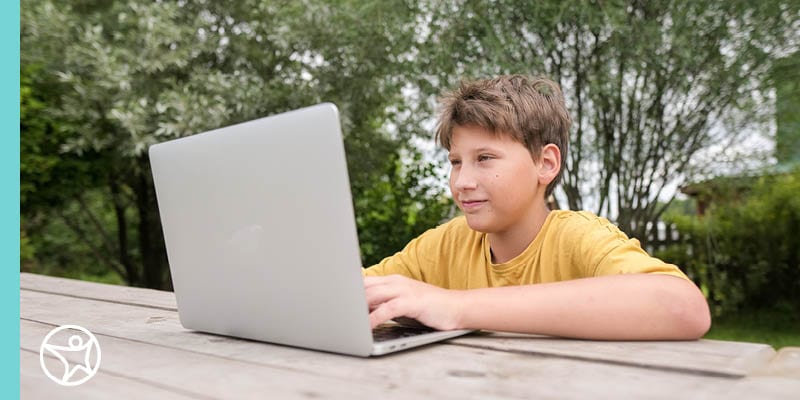6 Ways Online Students Can Socialize Outside of the Classroom
by Phoebe Brown
byJulie Hersum
5 min to readPicture your child learning … what do you see? You might envision them at a desk, pencil in hand, eyes on a worksheet or screen. But some of the most powerful learning experiences don’t always happen inside. In fact, stepping outside might be one of the best ways to “level up” your child’s education.
Outdoor learning can be more than a nice change of scenery for kids. It also can be an evidence-based educational approach to help students thrive academically, physically, emotionally, and socially.
From structured science lessons under a tree to spontaneous discoveries on a nature walk, learning outdoors—in nature, school gardens, parks, or even urban outdoor settings—can benefit kids in ways that learning indoors typically can’t.
Kids are spending more time indoors than ever before. Outdoor learning experiences and activities like hiking, exploring nature, or even measuring the circumference of a tree, get kids moving, benefiting their physical development, motor skills, balance, and overall fitness.
And the mental health benefits are just as significant. Research shows that time spent in nature lowers stress levels, reduces symptoms of anxiety and depression, and helps children feel calmer and more focused. The American Academy of Pediatrics and many mental health experts now encourage regular outdoor time to support emotional resilience.
Above all, learning outside gives kids a much-needed breather from doomscrolling and the pressures of modern life.
It might sound counterintuitive, but giving kids more time to play outside can actually help them perform better in school! A growing body of research, including findings from the Harvard Graduate School of Education, shows that students who learn outdoors often have improved attention spans and increased engagement in their studies.
Spending time outdoors also can be used as a natural reset to help students calm their minds and return to learning-related tasks with sharper focus and better problem-solving skills.
Outdoor environments bring surprises from strange bugs and cloud patterns to the way the wind blows through leaves. These observations can spark imagination and encourage more exploration. Because there’s no right way to observe a bird or stack stones by a riverbank, kids are freer to follow their curiosity, ask questions, and investigate the world in ways that build critical thinking skills and give them space to wonder, experiment, and invent.
Whether your student identifies plants, navigates trails, or works with a group to solve a challenge, outdoor learning provides opportunities for kids to take initiative and make decisions in a less controlled environment. These moments help build a sense of competence and independence.
Trying something new and succeeding, like climbing a hill, catching a frog, or leading a group project in the garden, helps kids see themselves as capable. They begin to trust themselves, take healthy risks, and learn from mistakes.
Outdoor learning also provides opportunities to practice practical skills, like patience, observation, collaboration, and persistence.
Outdoor learning isn’t always just about connecting with nature. It can also include connecting with others. Working together to plant a garden, build a fort, or conduct a science experiment builds teamwork and communication skills.
The unstructured aspects of outdoor play and learning allows kids to practice negotiation, conflict resolution, and other socialization skills in a natural setting.
Like outdoor learning, integrating outdoor play into daily routines gives students opportunities to experience holistic growth, including physical, mental, and cognitive development.
National Play Outside Day, the first Saturday of every month, aims to help families develop a habit of participating in outdoor fun and activities. Kids, adults, parents, and grandparents alike can benefit from a little more outdoor play, says playoutsideday.org.
In addition to the physical and emotional benefits of outdoor learning and play, the outdoors also enhances brain function. Exposure to green spaces improves cognitive performance, especially executive functioning skills, like planning, organizing, and self-control. For children with ADHD or sensory challenges, outdoor learning offers a calmer, more flexible environment that allows kids to be and feel their best.
Nature also fosters a deeper connection to the environment. Spending more time outside helps kids develop familiarity with nature—what researchers call naturalistic intelligence—which can foster environmental stewardship.
Finally, learning outdoors can give kids the opportunity and freedom to see themselves as more than students—as explorers, scientists, and artists.
With rising concerns about student well-being, outdoor learning offers a simple, cost-effective way to boost educational outcomes while promoting play and wellness. Flexible online school schedules offer families even more possibilities for integrating outdoor and online lessons.
And you really don’t need a forest or a sprawling field for outdoor learning. A backyard, a park, a school courtyard, or even a patch of grass can set the stage for meaningful learning experiences.
The benefits of learning outdoors go far beyond academics. Nature nurtures the whole child, offering experiences that build curiosity, resilience, empathy, and a lifelong love of learning. Even just a regular walk with purpose can present opportunities to grow.
If you’ve been wondering how to help your child feel more engaged, joyful, and confident in their learning, try taking things outside. Have your student grab a notebook and let learning take root under the open sky.
Learn more about Connections Academy’s flexible online solutions, download our eGuide, or find out if virtual school is right for your child by taking our online quiz.
